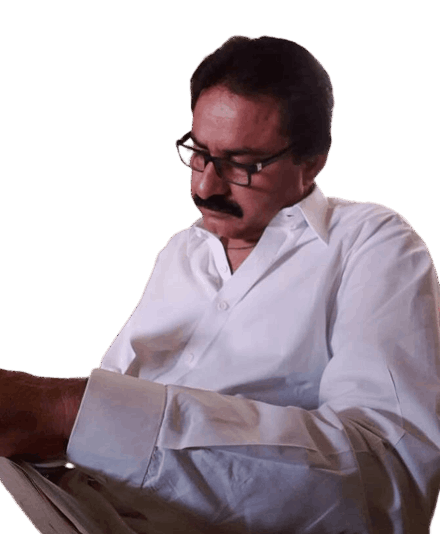تاريخ قومن جي ڪرتوتن, ڪمال ۽ زوال جي سچي تصوير نئين نسل تائين پهچائيندي آھي. اسان جي وڏڙن چڱايون بہ ڪيون تہ لڱايون بہ ڪيون. تاريخ انھن ۽ اهڙن سچن قصن سان ڀري پئي آھي. تاريخ اسان سنڌين جي هن عيب کي کولي بيان ڪيو آھي تہ سنڌ جي طبقاتي نظام ۾ اميرن ۽ غريبن قومي مسئلن تي هڪ ٿي قدم نہ کنيو آھي. اسان جو اپر ڪلاس پاڻ کي سرخرو ڪرڻ لاءِ غيرن آڏو تہ جهڪي پوندو آھي, قومي ڳالهين عوام کي پاڻ اڳيان جهڪڻ تي مجبور ڪندو آيو آھي. جڏهن بہ سرڪار عوام-دشمن قدم کنيا ۽ ان تي عوام اٿي پيو تہ اپر ڪلاس وڃي ظلم ۽ ڏاڍ ڪندڙ سرڪار جو پاسو ورتو ۽ ان جي حقن مفادن جي حفاظت ڪئي.
ٻيءَ مهاڀاريءَ لڙائيءَ ۾ مسلمانن جي دنيا ۾ وڏي کان وڏي سلطنت ترڪيءَ کي پاش پاش ڪيو ۽ پنهنجيءَ مرضيءَ وارا شرط ترڪيءَ تي مسلط ڪيا. ترڪيءَ کي شڪست ملي تہ سنڌ جو عام مسلمان تپي لال ٿي ويو ۽ حڪومت خلاف اٿي کڙو ٿيو. پر اسان جي وڏڙن مان ڪيترن تارون موڪلي برطانيہ سرڪار کي انھيءَ فتح تي مبارڪون ڏنيون. اهي تارون “ممبئي گزيٽ” ۾ شايع ٿينديون هيون. منھنجي والد ڊاڪٽر در محمد پٺاڻ انھيءَ “ممبئي گزيٽ” جا ڪيترا فائيل پڙھي, انگريزن جي عاشق سنڌي ماڻھن جي لسٽ ٺاهي آھي, جيڪا انگريزيءَ ۾ آھي. آئون انهيءَ لسٽ جو ڪجھ حصو اوهان جي خدمت ۾ پيش ڪريان ٿو:
1.His Highness the Mir of Khairpur,
2. Wali Muhammad Hassan Ali Effendi (Secretary General, Sindh Muhammadan Association),
3. Karachi Metal & Hardware Merchants’ Association;
4. Rao Sahib Jawahrsing of Sehwan;
5. Seth Harchandrai Vishindas (President, Karachi Municipality);
6.President, Karachi District Local Board;
7. Chiarman, Chamber of Commerce, Karachi;
8. Pandit Panchandas Shiwala of Larkano;
9. Shahdadpur Hindu Panchayat;
10.Pursumal Perumal,Zamindar, Shadpur;
11. Sardar Shahar Khan Shukrani of Kandhkot;
12. Kazi Fakhuruddin Imam Ali of Hyderabad;
13.Jehangir Kothari of Karachi;
14. M.F. Tharan Ajitsing, Zamindar of Thatta;
15. Jamait Islamia of Hyderabad;
16. Parsram Babumal Udesi of Jameabad;
17. The Secretary, Parsi Community of Hyderabad;
18. Dhagchand Asardas, Mukhtiyarkar of Shikarpur;
19. Umar Haji Qasim of Porbandar;
20. Dharamdas Bhagwandas of Nawabshah District;
21. Jaisinghani Hindu Zamidar of Tayab, Larkano;
22. Muhammad Ali Shah, Gadi khata of Karachi;
23. Naraindas Bhawandas, Zamindar & Hon. Magistrate, Berani;
24. Bhagwandas Vasudev of Berani;
25. Sufi Qalandar Bux , Zamindar Umarkot;
26. H.H.samaviedi, Secretary, Pushkarna Brahman maha Mandl, Hyderabad;
27. Bulchand Dayaram, President, Hyderabad Municipality;
28. Muhammad Hashim Gazdar, Assistant Engineer, Karachi (later on politician & Minister);
29. Khan Sahib Sardar Sher Muhammad Khan Bijarani of Kandhkot;
30. Metharam Ajitsing, zamindar of Shahbandar;
31. Ahmad Sabugar of Thatto;
32. The Chirman of the Trustees of the Parsi Anjuman, Karachi;
33. Muhammad Yahya Kazi Faizullah of Thatta;
34. Shivandas and other Hindus of Ketibandar;
35. Haji Ghulam Hussain Qasim, Municipal Councillor, Karachi;
36. Muhammad Ali Shah, Dy. Educational Inspector of Mulla Schools, Karachi;
37. Dalpatrai, Mukhtyarkar of Jati;
38. Wali Muhammad Khan Bhurgri, Zamindar of Jamesabad;
39. Uderomal Karomal, Zamindar & Vice President , Taluka Local Board, Jamesababad;
40. Muhammad Tahya Qazi Faizullah of Thatto;
41.Ganomal Karomal Mukhi, Jamesabad;
42. Syed Lalbux Shah, Zamindar & Bench Magistrate, Jamesabad;
43. Parsram Bambomal.
On this occasion, the Karachi Municipality (President is Seth Harchandrai Vishindas) passed the following resolution and sent to the Government”
“That the Karachi Municipality express profound thankfulness and heartfelt joy and tendres sincerest congratulations to His Majesty the king Emperor on the successful termination by the allied Nation of the gigantic, devastating and sanguinary World war resulting in the annihlation of Prussian Militarism and the conclusion of a just and glorious treaty of Peace which they trust will usher in a long earn of peace, prosperity and progress throughout world in which this city of Karachi and whole of India will participate”. ( This Message was publishedi n the Govt. of Bombay Gazette, dt. 2.9.1919)




